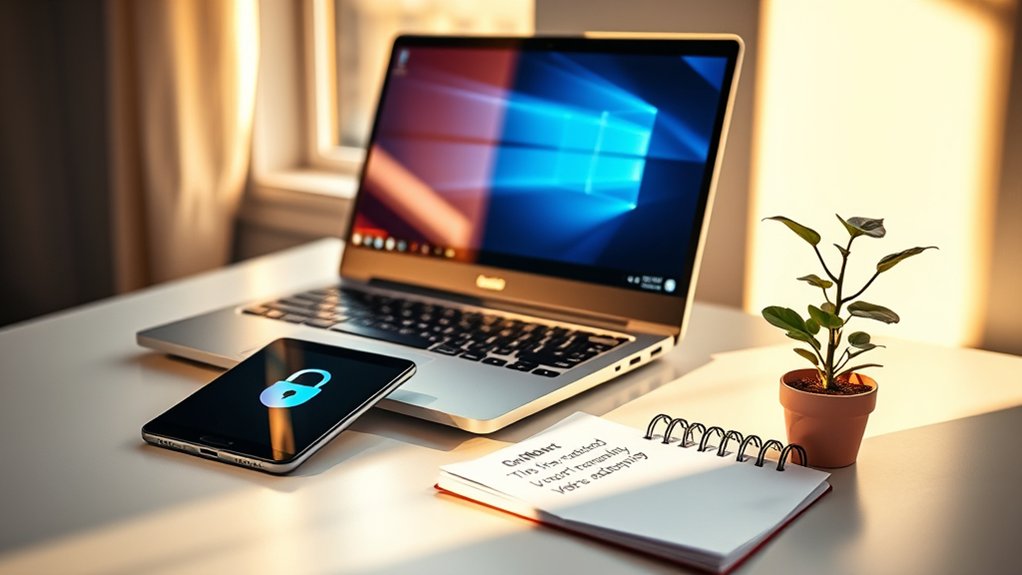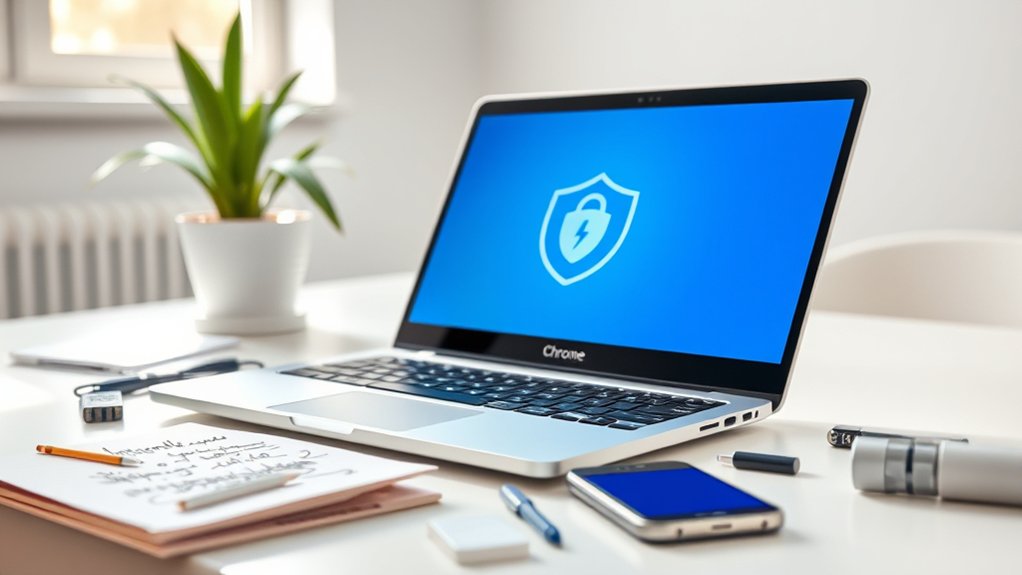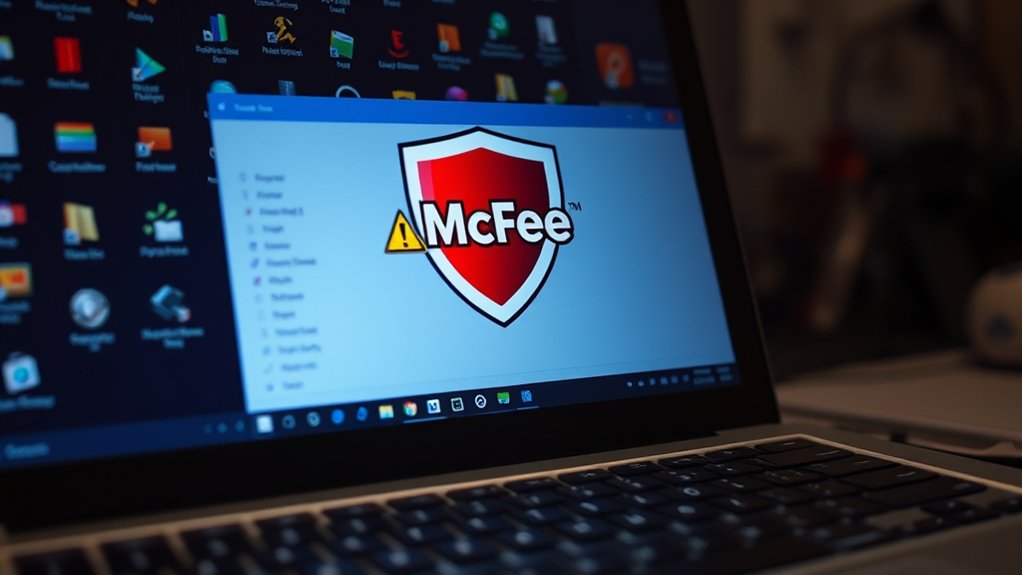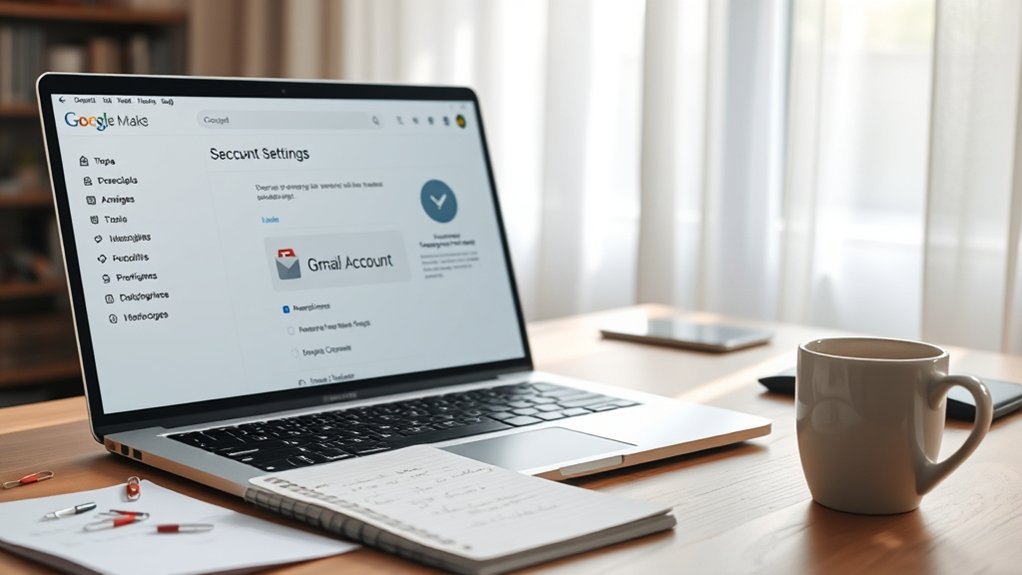To effectively remove a virus from a Chromebook, users should start by uninstalling any suspicious extensions. Chrome OS typically alerts users to potential threats, but unfamiliar extensions can still slip through. Next, performing a full system scan using trusted antivirus software can help identify hidden malware. Furthermore, resetting browser settings can eliminate malicious configurations. Regular updates and safe browsing practices are vital to preventing future infections. Implementing these strategies encourages a secure environment, enhancing overall device performance. More information follows.

Removing a virus from a Chromebook requires a systematic approach, since malware typically manifests in the form of malicious extensions or browser hijacks rather than traditional viruses. Even though Chrome OS incorporates strong security features like Verified Boot, it remains vulnerable to certain types of malware. The prevalence of malware on Chromebooks is considerably lower compared to other operating systems, but users may encounter symptoms such as unwanted advertisements, browser redirects, or general performance degradation that could indicate an infection.
To address potential malware threats, users can utilize trusted antivirus software like TotalAV. The installation of antivirus software should be conducted from reliable sources, ensuring that security is not compromised. Following installation, a full system scan is advised; this process can reveal and eliminate existing malware threats during adherence to the antivirus software’s instructions. Additionally, it is crucial to remember that while Chromebooks are more secure, they can still be affected by malicious extensions or compromised websites. Users should consider leveraging strong security features from Google Cloud to further enhance their overall security stance.
Moreover, users must actively manage their Chrome or Firefox extensions. Removing malicious extensions is vital, as these can compromise privacy by spying on user activity or generate revenue through unwanted advertisements. A practical method involves accessing the extension settings and eliminating any unfamiliar items, particularly those installed recently without user consent.
Resetting browser settings can further alleviate potential issues. Both Chrome and Firefox provide users with the option to restore their browsers to default settings, a procedure that cancels out malicious configurations while potentially impacting saved bookmarks and settings.
If concerns persist, a factory reset, or Powerwash, is an effective last resort. Performing a factory reset will erase all local data, thereby restoring original performance by eliminating entrenched malware.
To prevent future malware threats, maintaining current Chrome OS updates in addition to employing safe browsing practices is vital. Users are recommended to download apps exclusively from the Chrome Web Store or verified sources, avoid suspicious websites, and implement strong passwords coupled with two-factor authentication—these measures can greatly strengthen cybersecurity and improve overall device safety.
Frequently Asked Questions
Can Antivirus Software Be Installed on a Chromebook?
Antivirus software can certainly be installed on a Chromebook. Such software is available through the Google Play Store or Chrome Web Store, provided it is compatible with Chrome OS.
Popular choices include TotalAV and Malwarebytes, known for their effectiveness. Installing antivirus software improves security by providing additional protection against potential malware and phishing threats.
Regular updates and maintenance practices make certain the software operates at its best, reinforcing the Chromebook’s built-in security features.
What Are Signs That My Chromebook Is Infected?
Signs of a Chromebook infection include system sluggishness and frequent crashes, indicating potential malware presence. Unauthorized browser extensions may lead to altered settings or unexpected ads, contributing to a compromised experience.
Additional symptoms include unusual network activity, increased data usage, and delays in application launch times. Analysts underscore the importance of monitoring browser behavior, as rogue extensions can inject undesired content, potentially jeopardizing user privacy and security.
Is It Safe to Use Public Wi-Fi After a Virus?
Using public Wi-Fi after a virus infection poses significant security risks.
Experts warn that devices may remain vulnerable to re-infection without proper safeguards. A VPN can encrypt internet traffic, enhancing security; failing to use one can expose sensitive information.
In addition, avoiding suspicious websites is essential, as they can harbor malware. Regular updates to operating systems and the use of antivirus software with Wi-Fi protection features are recommended to mitigate potential threats during connection to public networks.
Will Factory Resetting Erase All My Files?
Factory resetting a Chromebook will erase all local files stored on the device, including those in the Downloads folder.
Nevertheless, files saved in cloud services like Google Drive remain intact. This process is often viewed as a final measure, particularly for troubleshooting issues such as malware.
It is crucial for users to back up important data prior to resetting, as the action cannot easily be undone, and local data will be permanently lost.
How Can I Prevent Future Infections on My Chromebook?
To prevent future infections on a Chromebook, individuals should prioritize regular updates, which are released approximately every six weeks.
Utilizing the Google Play Store and Chrome Web Store guarantees the installation of vetted applications, minimizing malware risks.
Furthermore, enabling Safe Browsing and avoiding suspicious websites improves security.
Utilizing strong passwords alongside two-factor authentication adds layers of defense.
Finally, regular antivirus scans further mitigate threats, providing an additional safeguard against potential infections.









